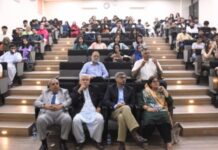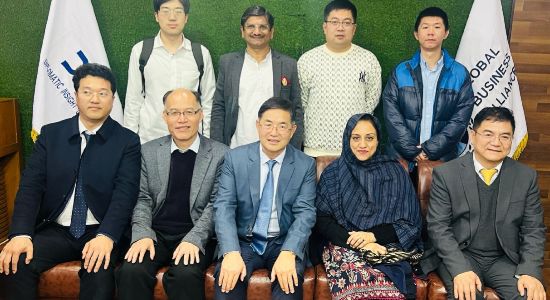ISLAMABAD, Mar 10 (NNI): To strengthen agricultural collaboration between Pakistan and China, the Diplomatic Insight Group (DIG) has hosted a distinguished delegation from China, comprising top agricultural scientists and business leaders.
According to Private Media Report, this significant gathering aimed at fostering discussions on innovative agricultural practices, sustainable development, and the promotion of international agricultural cooperation, according
Dr. Farhat Asif, Chairperson of Diplomatic Insight Group, and CEO Mr. Muhammad Asif Noor welcomed the Chinese delegation to their office. The delegation included Prof. Dr. He Cheng from China Agricultural University, Prof. Dr. Wang Jingyu from Northwest A&F University, and executives from leading companies like Tianjin Henrylead Biotechnology Development Co., Ltd, and Fujian Shengnong Biotechnology Co., Ltd, etc.
The Diplomatic Insight Group’s subsidiary, the Centre for Belt and Road Initiative (BRI) and China Studies- Institute of Peace and Diplomatic Studies (IPDS), is already playing a crucial role in enhancing Pakistan’s agriculture sector.
Through organizing seminars, webinars, and conferences, and facilitating Chinese agricultural companies in Pakistan, IPDS is at the forefront of bridging the knowledge and technology gap between Pakistan and China in agriculture.
The discussion was enriched as the participants discussed the future of agriculture and livestock management, including discussions on the growth of livestock, advancements in vaccinations, and the manufacturing of dairy products like cheese.
Particular emphasis was placed on the innovation in technological and scientific methods to enhance the health and productivity of cows, buffaloes, and other livestock, showcasing a shared vision for a more sustainable and efficient agricultural future.
One of the most enlightening parts of the meeting was around the implementation of advanced scientific and technological strategies in livestock management.
The experts explored the development of comprehensive vaccination programs for poultry, innovative cheese manufacturing processes, and breakthroughs in improving the health of cows and buffaloes.
These discussions highlighted the potential for significant improvements in animal welfare and productivity and emphasized the importance of sustainable practices in the global food supply chain.
This meeting has laid the groundwork for future joint ventures, exchange programs, and research initiatives that promise to bring about transformative changes in agriculture and livestock management across the globe. NNI








































